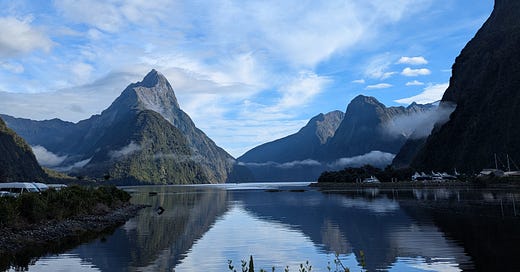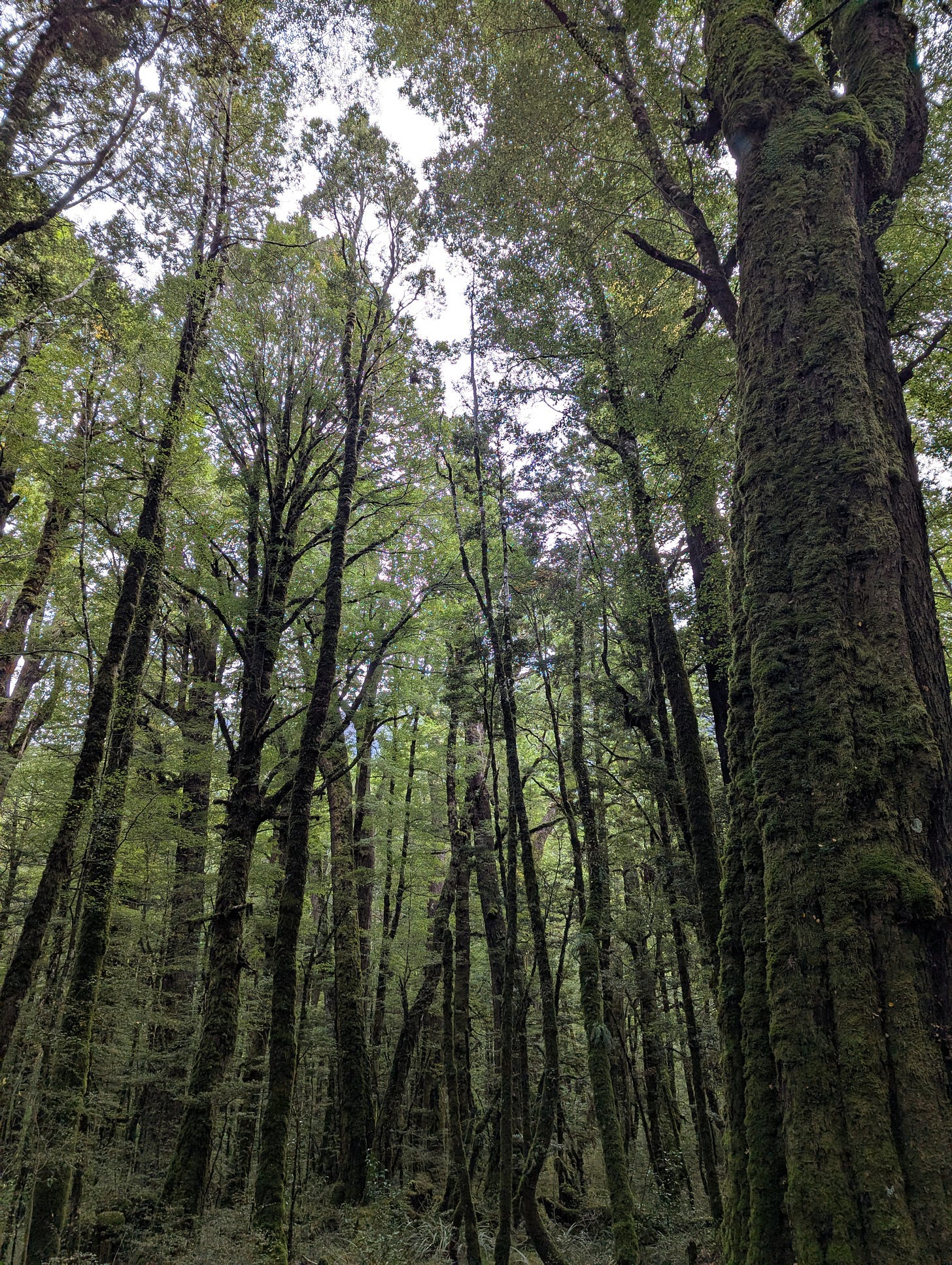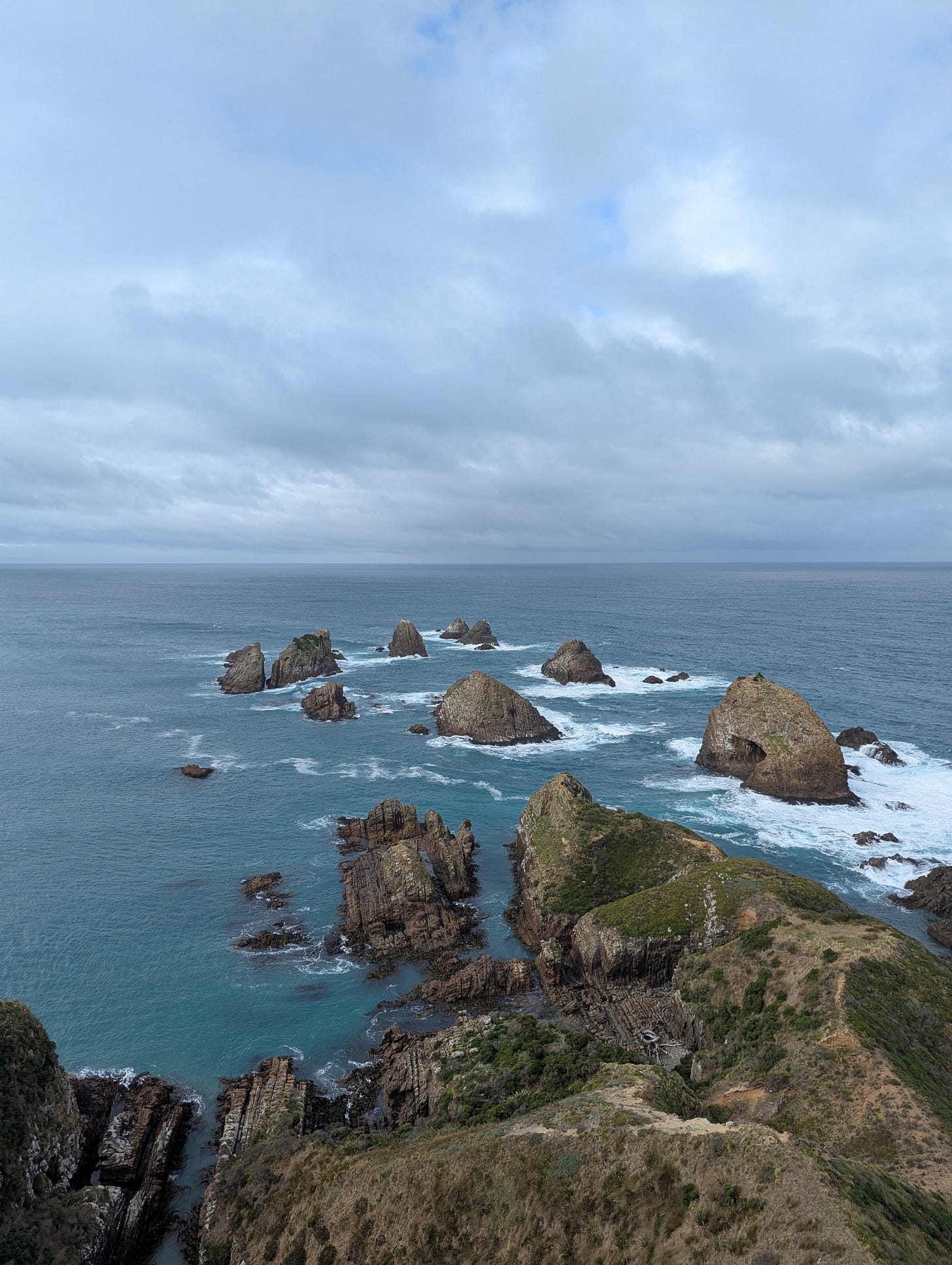Exactly two weeks ago, I was visiting one of the wonders of the world.
I type this now from my spare bedroom in Philadelphia, looking out at a drizzly morning and my neighbor’s backyard. But two weeks ago, I was in a magical location: Milford Sound, or Piopiotahi. It’s a fjord on the south island of New Zealand, a dramatic place with steep mountains and deep water. It was otherworldly.
And my son hated it.
He was not having it. That day at Milford Sound, arguably the pinnacle of our trip, our whole reason for going? He was pissed.
We took a boat tour, and the whole time he was whining and cranky. He’s almost four, and in retrospect, it was a lot to ask that he keep still on a boat. He kept darting away, which isn’t the greatest thing when you’re with a kid who can’t yet swim on a body of water that’s 1,600 feet deep. My multiple attempts at securing a holiday card photo were foiled, as he kept turning away in defiance whenever I asked a stranger to take our picture.
“What a special thing, that he gets to visit this place,” a fellow tourist said to me. “He’ll remember it forever.”
It was a kind comment, but absolutely untrue. He won’t remember it at all. And it made me think: Why bother traveling with kids at all?
Our trip had many amazing moments, too. My kid loved hiking and climbing on rocks. He loved cuddling in hotel beds. He loved all the desserts we got to try.
Milford Sound was a beautiful day for my family in its own way, too. I still think of it as a highlight of the trip – it really is a stunning natural place. But as I chased my son around the tourist boat, I thought about my experiences at other “wonders of the world,” many of which I’ve been lucky to visit over the years.
It’s a strange thing, to visit a place we’ve seen so many images of. Our expectations complicate reality. There’s so much anticipation that the visit itself can feel surreal.
I remember being 23 and visiting the Pyramids of Giza, trying to summon a sense of awe for the humans who constructed them but feeling ashamed for thinking instead about my crush at the time. Or visiting Macchu Picchu at age 26, worrying that that trip – taken during my last medical school summer vacation – would be the last one I ever took, as I contemplated the notoriously busy medical training that awaited me. Or Angkor Wat, in my early 30s, thinking about marriage and parenthood instead of history.
There’s always a tension between the way we actually feel and the way we think we should feel. When we travel, when we’ve spent so much money and effort getting ourselves to a supposedly transcendental place we’ve seen online a million times, that tension is heightened. What’s the point, if even at Milford Sound, I’m still my same old petty and anxious self?
My son was certainly still himself. He couldn’t care less about how much we paid to get there or the fact that this place has been a source of awe and legend for generations of Maoris. He was hungry and restless; he wanted to climb and run when we were asking him to sit and contemplate.
It made me think about the viral New Yorker essay from a few years ago by philosopher Agnes Callard called The Case Against Travel, in which she argues that having travelled does not make us special.
“Travel turns us into the worst version of ourselves while convincing us we’re at our best,” she wrote.
In my 20s I spent a few years working in public health in Tanzania and Malawi before I went to medical school. I thought the fact of it made me interesting, that I had lived in Africa. I do think there are many good reasons to study or live in a different country, but looking back on it, I’m not sure the experience in and of itself turned me into an interesting person. Plenty of boring people move to new places.
And in New Zealand, things didn’t feel all that different from back home. Traveling in English-speaking countries often feels familiar, especially for a (comparatively) short trip rather than an extended stay. There were no language snafus, no awkward cultural misunderstandings. I went to a lot of coffee shops with the same white subway tiles and indoor plants, a symbol, the writer Kyle Chayka argues, of all culture regressing to an algorithm-fueled Internet mean.
“Travel gets branded as an achievement: see interesting places, have interesting experiences, become interesting people,” Callard wrote. “Is that what it really is?
So if my kid won’t remember our trip, why bother hauling him across oceans and continents? Because I will remember this trip, and being there with him was, in many unexpected ways, a meaningful experience.
I didn’t have the transcendental moment I imagined I’d have at Milford Sound. Nor, I suspect, did my son. (My husband might have had one, though – he looked like he was having a divine revelation when he stuck his head in one of the thousand-foot-high waterfalls there, which he weirdly enjoyed.)
Still, traveling with a preschooler has its own magic. The fact that my son was so uninterested in any expectations for the trip was revelatory; he didn’t have any preconceived ideas about what it should be from looking at social media or guidebooks or talking to friends about the place you just have to visit.
For him, it was simply new. The airplane was new. The rental car was new. The powdered hot chocolate in every hotel was new. And yes, the things we went there for – the stunning hikes and giant ferns and birds with long beaks – were also new. Seeing it alongside a kid, through his eyes, was a surprising gift.
Pre-parenthood, I had a tendency to push myself hard when traveling – jetlag be damned – which is now impossible with a kid. We had to take breaks. I waited in a lot of parking lots while my kid climbed on rocks and fences. When my son complained that he had to use the bathroom, I was secretly relieved to give up on completing a giant maze. (Thank god for emergency exits.) And as is often the case, slowing down yielded some unexpected benefits. I got to notice different things.
Perhaps most importantly, I feel like I got to know my son better. Like most working families in the U.S., we spend most weekdays apart: he’s at school, and I’m at work. I’m grateful for this; for both my sake and his, I think it’s good – great – that he spends time with teachers and peers.
But I also felt lucky to have 21 consecutive days with him, learning his rhythms and personality at this particular moment in time. When I was in my 20s, friends would always say that traveling with a boyfriend was the way to see his true self, to understand the true nature of a relationship. Maybe traveling with a kid is the same.
Bonus! For NPR, I interviewed Casey Johnston about her new book A Physical Education. It’s about how she gave up dieting and took up weight lifting, but it’s also about so much more: treating our bodies with care, respect, and kindness. It’s worth a read.







This is so good! Thank you. A year ago we took my then four-year-old to the Sydney Aquarium to see penguins, her longtime favorite animal. She was cranky and distracted and we declared it a bust. Yesterday she said "Remember when we went to the Sydney Aquarium to see penguins and we sat in a little boat together and mommy you were next to me and they were SO CUTE!" Kids!
One of our now legendary family stories is 7 year old me whining at Petra "I don't care how old it is, I just care how HOT I am!" And yet, I look back so fondly on the fact that my parents took us everywhere they could when our family lived in Greece (age 5 to 8 for me, 8 to 11 for my brother) even though in many cases we didn't have context for what we were seeing (especially me, being so young). Though I may not have appreciated exactly how old the ancient Greek ruins were, I loved the great stories in the mythology, and learning about the ancient Olympics. There was something to hook me even at my tender age!